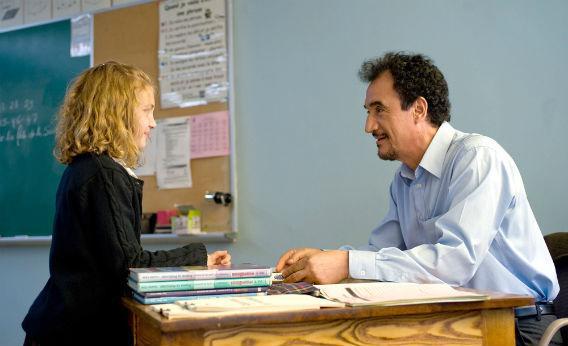Monsieur Lazhar (Music Box Films), the French-Canadian film that was a nominee for this year’s foreign-language Oscar, belongs to an uncommon tradition of movies about students and teachers. It’s not an uplifting ode to the transformative power of pedagogy, in the mode of Stand and Deliver; rather, like 2008’s The Class, it’s a quiet, sometimes achingly painful meditation on both the possibilities and the limits of the teacher-student relationship. The title character, an Algerian immigrant who steps in to teach a class of Montreal sixth-graders after their teacher commits suicide, is no inspirational firebrand but a courtly, soft-spoken man who has trouble adjusting his traditional values to the needs and expectations of 21st-century kids. Bachir Lazhar (Mohamed Fellag, identified in the credits as simply Fellag) wants his students to transcribe from a Balzac novel, when Jack London is more their speed; when a student acts disrespectful, he casually cuffs him on the side of the head.
In short order, the school’s devoted but worn-down principal (Danielle Proulx) brings Bachir up to speed on the customs of 21st-century education: There will be no touching the children under any circumstances, not even to give an encouraging hug. And all mention of Martine, the dead teacher, must be avoided, except during periodic visits from the officiously soothing school psychologist.
Of course, the children’s grief and confusion can’t be managed as neatly as all that, and Bachir’s class remains haunted by the memory of Martine, who, in a chilling opening scene, is found hanging in the classroom one morning by an already-troubled boy named. Simon and another student, Alice, who also caught a glimpse of the body on that day, can’t stop bringing up Martine’s death in class. Alice’s oral presentation about school pride drifts into a lament for her beloved teacher, and Simon secretly carries a photo of Martine around with him. In the second half of the film, it’s revealed that Mr. Lazhar is mourning his own losses, in a less public but no less painful way.
Though its story may sound formulaic on paper, please take my word for it: Monsieur Lazhar, written and directed by Philippe Falardeau, is a sharply intelligent, deeply sad, and not remotely sappy film about both teaching and collective grief. Its surface may be still and quiet, with cool colors, wintry landscapes, and a delicate piano score, but the emotions beneath run tumultuous and deep. Fellag, an Algerian comedian and humor writer, anchors the film as the ineffable Bachir, a man who’s so private that even the third-act revelation of his back story doesn’t fully explain his motivations to us (nor would we want it to). The children who play Alice and Simon, Sophie Nélisse and Émilien Néron, are exceptional in their scenes with him, and even better when they’re alone together. With almost no words exchanged, we understand how these two are bound by the shared sight of their teacher’s suspended corpse that awful morning. Monsieur Lazhar—the character as well as the movie—offers no simple answers to the hard questions Martine’s death poses: Why did this beloved young teacher kill herself where she knew her students would find her? Will Simon and Alice be permanently traumatized by what they saw? What can their teacher, or anyone, do to help them move on?
Though it’s no Dead Poets Society by a long shot, Monsieur Lazhar does ultimately affirm, in its oblique, understated way, the sacredness of the teacher-student relationship. For an old-fashioned, at times rigid teacher like Bachir, the classroom is a place where order and formality must rule, not for their own sake but as a bulwark against the often incomprehensible chaos and violence of the world outside.
